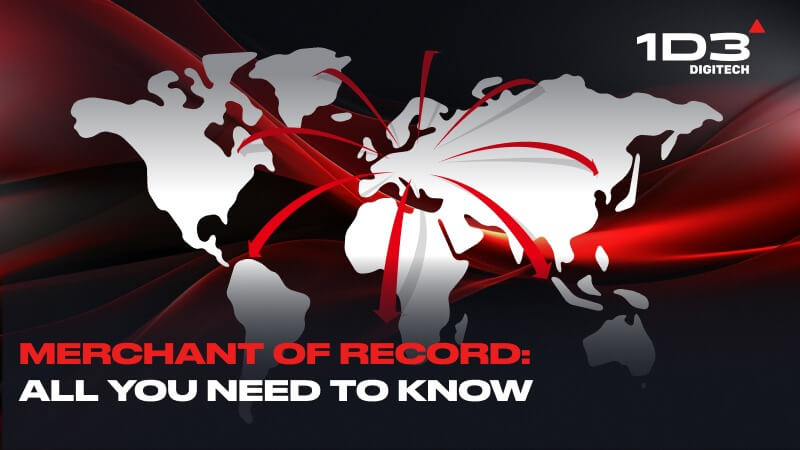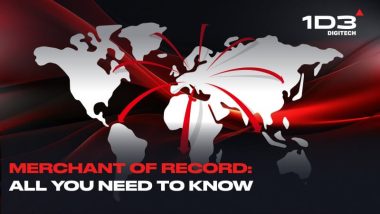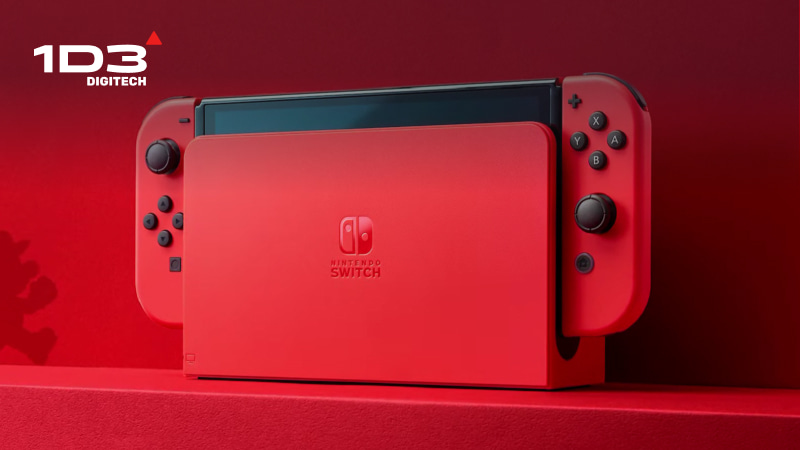If you're running a digital business, such as a video game, selling digital products, or offering SaaS, you've probably noticed that operating across different countries can get tricky. Different tax laws? Varying payment habits? It can be a lot to handle. That's where Merchant of Record comes in — they're designed to tackle these challenges and simplify global expansion. This article will tell you everything you need to know about the Merchant of Record services and how they can help your business grow internationally.
Merchant of Record Definition
A Merchant of Record is an entity legally responsible for processing transactions, collecting and remitting taxes, and ensuring compliance with financial regulations during a sale. The MoR handles everything from payment processing to managing chargebacks, effectively taking on the transaction's financial and legal liabilities.
TRY THE MOST COST-EFFECTIVE MERCHANT OF RECORD SERVICE
GET IN TOUCH WITH 1D3Legal and Financial Responsibilities
- Payment Processing: The MoR processes customer payments through various methods, including credit cards, PayPal, and other digital wallets.
- Tax Compliance: It calculates, collects, and remits taxes such as VAT, GST, and Sales Tax to the appropriate authorities.
- Regulatory Compliance: Ensures adherence to international financial regulations, including PCI DSS and GDPR.
- Chargeback Management: Handles disputes and chargebacks, protecting the business from potential losses.
Companies in sectors like SaaS, gaming, digital goods, and e-commerce rely on MoRs to handle global payment processing, tax calculations, and compliance with international regulations. Outsourcing these complexities allows businesses to focus on their core offerings without the legal and financial challenges of operating in multiple countries.
Merchant of Record vs. Payment Service Provider
A Merchant of Record is legally responsible for processing payments, handling taxes, and ensuring compliance during a sale, assuming all financial liabilities like chargebacks and fraud prevention. A Payment Service Provider (PSP), such as Stripe or Adyen, enables businesses to accept online payments but doesn't take on these legal and financial responsibilities.
While PSPs facilitate payments, you remain responsible for tax compliance, regulatory adherence, and dispute management. The critical difference is liability: MoR manages the entire transaction and legal obligations, whereas a PSP provides payment tools without assuming these duties.
Merchant of Record vs. Payment Gateway
A Payment Gateway is a technology that securely transmits payment data from the customer to the acquiring bank, enabling transaction authorization. It acts as a bridge between a merchant's website and payment networks.
A Merchant of Record processes payments and assumes legal responsibility for the entire transaction, including tax compliance and handling chargebacks. While a payment gateway is a tool within the payment process, the MoR oversees the complete transaction lifecycle, including compliance and risk management.
A payment gateway technically facilitates payments, whereas the MoR is legally accountable for the sale.
Merchant of Record vs. Seller of Record
The Merchant of Record is responsible for processing payments, handling taxes, ensuring compliance during a transaction, and taking on financial liability. The Seller of Record legally sells the product or service, owns inventory, and handles fulfilment and customer service.
Sometimes, the Merchant of Record and the Seller of Record are the same company. However, some businesses keep the SoR functions in-house to maintain control over their branding while outsourcing the MoR functions. The key difference is that the MoR handles the legal and transactional aspects, while the SoR is responsible for product ownership and delivering goods or services to the customer.
Merchant of Record Business Model
The Merchant of Record business model simplifies global commerce by handling the complexities of international transactions on behalf of businesses. An MoR enables businesses to sell in multiple countries without setting up local entities, navigating foreign tax laws, or managing currency conversions. By utilizing merchant of record services, companies can overcome these challenges and simplify global expansion, reaching a wider audience with less effort and reduced risk.
Transaction Flow Explained
- Customer Purchase: A customer buys a product or service from your website to your app.
- MoR Processes Payment: MoR processes payments using its own merchant accounts.
- Tax Handling: It calculates and includes the necessary taxes at checkout, ensuring accurate tax compliance.
- Regulatory Compliance: Ensures all legal requirements are met during the transaction, adhering to international financial regulations like PCI DSS and GDPR.
- Settlement: Funds are transferred to your business account after fees, taxes, and the MoR's service charges are deducted.
The MoR makes money by charging fees for the services it provides. These fees compensate the MoR for handling payment processing, tax compliance, regulatory adherence, and risk management. Typically, these fees range from 3% to 10% of each transaction, with 3% being the lowest on the market.
Additionally, some Merchant of Record companies, especially those focusing on particular industries, offer extra services like WebStores, advanced analytics, customer support, and more.
Most of these companies charge extra for these additional services, adding to the overall business cost. However, 1D3 DIGITECH stands out by including these additional services at no extra charge, providing greater value to businesses seeking a comprehensive MoR solution.
Merchant of Record Services in Detail
Most Merchant of Record companies offer various services tailored to specific industries. However, the following three are the core services that all MoRs provide:
Core Merchant of Record Services
- Payment Processing: Since MoRs typically work with international businesses, they offer a wide array of payment methods to cover most countries. These include popular options like credit and debit cards, PayPal, bank transfers, and regional methods such as cash vouchers and local e-wallets. By providing diverse payment options, MoRs help businesses cater to customers' payment preferences worldwide.
- Sales Tax Management: Each tax jurisdiction has its own tax rates, procedures, and timelines. A Merchant of Record calculates, collects, and remits the appropriate tax amounts on behalf of its clients, ensuring 100% sales tax compliance. This includes handling VAT, GST, and other local taxes, relieving businesses of the complex burden of international tax regulations.
- Risk and Chargeback Management: As the MoR provides the checkout process to its clients, it is responsible for combating payment fraud, lowering the business's risk. The Merchant of Record also handles legitimate and fraudulent chargebacks, managing disputes with financial institutions to protect the merchant's revenue and reputation.
Additional Merchant of Record Services
Depending on the industry in which a Merchant of Record operates, it may offer additional services catering to specific needs. For example, 1D3 DIGITECH specializes in digital products, SaaS, and video games, offering the following additional services:
- Website Builder: A tool to create and customise websites without coding skills, enabling businesses to quickly establish a solid online presence.
- WebStore: An e-commerce platform allowing businesses to showcase and sell digital products without heavy platform fees.
- Analytics: Advanced analytics tools that provide insights into customer behaviour and sales trends, helping businesses make data-driven decisions.
- Customer Support: Dedicated customer service solutions to handle inquiries, troubleshoot issues, and enhance customer satisfaction.
- Mobile SDK: Software Development Kits for mobile platforms, allowing seamless payment processing integration and other MoR services into mobile apps.
- Subscription Management: Tools to handle recurring billing, manage subscriptions, and offer flexible pricing models, essential for SaaS businesses.
- Invoicing: Automated invoicing solutions that generate and send client invoices, streamlining the billing process.
Other Merchant of Record companies focusing on different industries may offer alternative services. For example, an MoR working with physical goods e-commerce may provide services like:
- Inventory Management: Tools to track stock levels, manage orders, and handle logistics.
- Fulfillment Services: Warehousing and shipping solutions to deliver products to customers efficiently.
- Returns Management: Processes to handle product returns, exchanges, and refunds.
- Global Logistics Support: Assistance with international shipping regulations, customs clearance, and freight forwarding.
By offering these additional services, MoRs provide comprehensive solutions tailored to the specific needs of businesses in various sectors. This simplifies operations and enhances the overall customer experience, making it easier for businesses to scale and succeed in the global market.
Best Merchant of Record Companies
Selecting the right Merchant of Record is essential for businesses looking to simplify international sales and ensure compliance. Here are some of the top merchant of record companies:
1. 1D3 Digitech
Industry Focus: Digital Products, SaaS, and Video Games
1D3 Digitech specializes in MoR services for digital businesses, including software-as-a-service (SaaS), videogames, and digital products. We offer core services like payment processing, sales tax management, and fraud protection. What sets 1D3 DIGITECH apart is our additional services — a website builder, analytics, customer support, mobile SDK, subscription management and invoicing — all provided at no extra charge. This comprehensive approach helps businesses streamline operations and focus on growth.
2. FastSpring
Industry Focus: Software and Digital Goods
FastSpring is a global MoR platform tailored for software companies and digital goods vendors. They handle international payment processing, tax compliance, and chargeback management. FastSpring also offers customizable storefronts, subscription management tools, and global customer support. Their services enable businesses to sell worldwide easily without worrying about the complexities of international regulations.
3. Paddle
Industry Focus: SaaS and Software Companies
Paddle provides an all-in-one commerce platform designed for SaaS and software businesses. Acting as the Merchant of Record, Paddle manages payments, taxes, subscriptions, and compliance on behalf of their clients. This allows companies to simplify their software sales globally, eliminating the need to integrate multiple vendors and navigate complex international laws themselves.
Is Stripe a Merchant of Record?
No, Stripe is not a Merchant of Record. Stripe is a Payment Service Provider (PSP) and payment gateway that facilitates online payment processing but does not assume legal responsibility for tax compliance, regulatory adherence, or chargeback management. Businesses using Stripe remain responsible for these obligations.
Is Adyen a Merchant of Record?
No, Adyen is not a Merchant of Record. Adyen is a global Payment Service Provider offering payment processing solutions across various channels. While Adyen streamlines payment acceptance, businesses are responsible for handling taxes, compliance, and financial liabilities associated with transactions.
Conclusions
Dealing with international sales can be pretty overwhelming. Different tax laws, unique payment habits, and a maze of regulations can make anyone's head spin. That's where Merchant of Record services step in to save the day. They handle payment processing, take care of taxes, manage compliance, and tackle risk management, so you can focus on growing your business. Companies like 1D3 DIGITECH, FastSpring, and Paddle specialize in different industries, offering customized services that make going global much easier.
It's also crucial to know how an MoR differs from other payment services out there. While Payment Service Providers like Stripe and Adyen help you process payments, they don't take on legal liabilities or handle compliance issues. Choosing the right Merchant of Record can seriously streamline your international operations, making it a smart move for any business looking to succeed globally.








